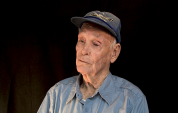5:42 | Injured and dazed from his bail out at 18,000 feet, Bob Honeycutt was taken into the home of an Austrian family until the local officials came to arrest him. He was cared for so well, he had to wonder, why were these civilians treating him like a friend? Part 2 of 6. (This interview made possible with the support of PHILIP J. O'NEILL.)
Keywords : Robert Bob Honeycutt Austria civilian coffin .45 cal pistol Prisoner Of War (POW) underground

As a young Army Air Corps recruit, the only thing Bob Honeycutt didn't like was Morse code, but he was slotted to be a radio operator on a B-24 crew, so he shrugged it off. After dodging plane crashes in training and German torpedoes in the Atlantic, he made it to the Middle East where he going to be based. (This interview made possible with the support of PHILIP J. O'NEILL.)
Bob Honeycutt was trained as a radio operator but he was switched to weatherman when his unit got to North Africa. Attached to the RAF while he trained, he rejoined his B-24 squadron in Libya, where he also was wounded for the first time in an air raid. (This interview made possible with the support of PHILIP J. O'NEILL.)
Once the B-24 squadron moved to Italy, the required number of missions was increased. Bob Honeycutt describes the missions over Ploiesti, where the anti-aircraft fire and German fighters were intense. His primary job was cameraman, but he became a gunner if any of them were wounded. (This interview made possible with the support of PHILIP J. O'NEILL.)
It was his 29th mission, a bombing raid over Austria, when Bob Honeycutt's luck ran out. First they lost an engine. Then, when they dropped behind the formation, they were swarmed by German fighters. As the gunners fell one by one, a rocket finally set the plane on fire and blew him right out into the air. Part 1 of 6. (This interview made possible with the support of PHILIP J. O'NEILL.)
After a hearty breakfast with his German guard, Bob Honeycutt left the comfort of the Alps, where he had bailed out, for the misery of the German POW system. First came the mind games of the interrogation. Then, he wound up at Stalag Luft IV, one of the worst camps, where he learned new meanings for "cold" and "hungry." Part 3 of 6. (This interview made possible with the support of PHILIP J. O'NEILL.)
After eight months in the prison camp, Bob Honeycutt could hear the guns of the Russian Army approaching, but he was not going to be free anytime soon. The German guards forced 10,000 men out of the gate and onto the road, where they began a forced march, with no known destination. The deprivation and cruelty was mind numbing. Part 4 of 6. (This interview made possible with the support of PHILIP J. O'NEILL.)
The little known "death march" of the men of Stalag Luft IV lasted 86 days. That was when an Allied tank column rolled up and the Russian prisoners took their revenge on a particularly sadistic German guard. With a friend, Bob Honeycutt set out toward a small town, where they spotted a truck in a garage. Mighty tempting. Part 5 of 6. (This interview made possible with the support of PHILIP J. O'NEILL.)
With a commandeered truck, newly liberated POW Bob Honeycutt made three trips into Belgium, loaded down with as many freed US airmen as he could carry. He'd lost half his weight and was eaten up with lice, but he'd made it. When he got back home to Chattanooga, both he and his family had a big surprise. Part 6 of 6. (This interview made possible with the support of PHILIP J. O'NEILL.)